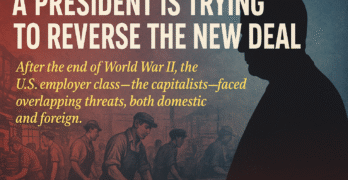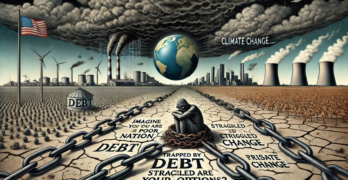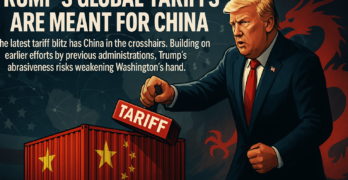After the end of World War II, the U.S. employer class—the capitalists—faced overlapping threats, both domestic and foreign. On the domestic side, a coalition of the Congress of Industrial Organizations (CIO), two socialist parties, and a communist party had grown large and powerful during the 1930s Great Depression.
Imagine You Are a Poor Nation, Trapped by Debt and Strangled by Climate Change—What Are Your Options?
Climate change, debt, and development have a caustic relationship, hindering economic justice and national advancement, but solutions exist.
Trump’s Global Tariffs Are Meant for China
The latest tariff blitz has China in the crosshairs. Building on earlier efforts by previous administrations, Trump’s abrasiveness risks weakening Washington’s hand.
First, They Came for the Venezuelans
Trump is turning deportation into a weapon of mass destruction. None of us—undocumented immigrants, people with papers, naturalized citizens, or native-born citizens—are safe.
Anthropology for Kids and Visual Assembly Are Reimagining Work, Education, Money, and More.
These interactive books and events encourage fresh perspectives on long-standing social systems.
The Coming Age of Border Changes?
Trump’s remarks on annexing territory and recognizing Russian and Israeli territorial gains may align with his geopolitical ambitions, but the disruption to longstanding norms of fixed borders sets a risky precedent.
The Carbon Soil Opportunity: Organic Farming Helps Counter Climate Change
Switching to organic products is an easy way to eat healthier and support the environment.
What Would a Real Renewable Energy Transition Look Like?
The seven steps that could help build a social movement and ensure a sustainable future.
Do Other Animals Have Consciousness? Science Could Force Us to Rethink Our Relationships With Them
The broad consensus is that many species are sentient.
The Growth of Malignant and Exclusionary Social Movements
The U.S. and many other societies are cycling into situations of toxic polarization today; discussion, let alone consensus, often appears impossible and the advantage goes to exclusionary social movements built on malignant rather than goodwill impulses.









